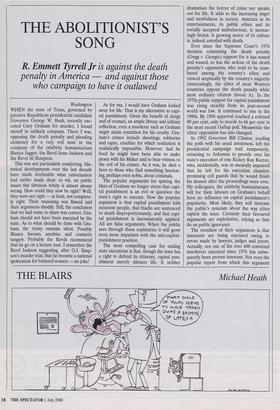THE ABOLITIONIST'S SONG
penalty in America — and against those who campaign to have it outlawed
Washington WHEN the state of Texas, governed by putative Republican presidential candidate Governor George W. Bush, recently exe- cuted Gary Graham for murder, I found myself in unlikely company. There I was, opposing the death penalty and pleading clemency for a very evil man in the company of the celebrity humanitarians Bianca Jagger, the Revd Jesse Jackson and the Revd Al Sharpton.
This was not particularly comforting. His- torical developments over the last decade have made irrefutable what ratiocination had earlier made clear: to wit, on public issues this fabulous trinity is almost always wrong. How could they now be right? Well, they were not right — at least, not complete- ly right. Their reasoning was flawed and their arguments shoddy. Still, the conclusion that we had come to share was correct. Gra- ham should not have been executed by the state. As to what should be done with Gra- ham, the trinity remains silent. Possibly Bianca favours aerobics and cosmetic surgery. Probably the Revds recommend that he go on a lecture tour. I remember the Revd Jackson suggesting, after O.J. Simp- son's murder trial, that he become a national spokesman for battered women — no joke! As for me, I would have Graham locked away for life. That is my alternative to capi- tal punishment. Given the benefit of clergy and of counsel, an ample library and solitary reflection, even a murderer such as Graham might attain contrition for his cruelty. Gra- ham's crimes include shootings, robberies and rapes, cruelties for which restitution is realistically impossible. However, had he lived he might have been able to make peace with his Maker and to bear witness to the evil of his crimes. As it was, he died a hero to those who find something fascinat- ing, perhaps even noble, about criminals.
The popular arguments for sparing the likes of Graham no longer stress that capi- tal punishment is an evil or question the state's right to execute. Now the popular argument is that capital punishment kills innocent people, that blacks are sentenced to death disproportionately, and that capi- tal punishment is inconsistently applied. All are false arguments. When the public sees through these sophistries it will grow even more impatient with the anti-capital- punishment position.
The most compelling case for ending state executions is that, though the state has a right to defend its citizenry, capital pun- ishment merely silences life. It neither dramatises the horror of crime nor speaks out for life. It adds to the increasing anger and morbidness in society. America in its entertainments, its public ethics and its socially accepted misbehaviour, is increas- ingly brutal. A growing sector of its culture is, indeed, entoiled with death.
Ever since the Supreme Court's 1976 decision reinstating the death penalty (Gregg v. Georgia) support for it has waxed and waned; so has the ardour of the death penalty's opponents, who tend to be num- bered among the country's elites and viewed sceptically by the country's majority (interestingly, the elites of most Western countries oppose the death penalty while most ordinary citizens favour it). In the 1970s public support for capital punishment was rising steadily from its post-second world war low. It continued to rise in the 1980s. By 1994 approval reached a colossal 80 per cent, only to recede to 66 per cent in the most recent Gallup poll. Meanwhile the elites' opposition has also changed.
In 1992 Governor Bill Clinton, reading the polls with his usual astuteness, left the presidential campaign trail temporarily, returning to Arkansas to preside over his state's execution of one Rickey Ray Rector, who, incidentally, was so mentally impaired that he left for his execution chamber promising cell guards that he would finish his dessert after the proceedings were over. My colleagues, the celebrity humanitarians, will for their labours on Graham's behalf have no influence on capital punishment's popularity. Most likely, they will increase the public's cynicism about the way elites exploit the issue. Certainly their favoured arguments are exploitative, relying as they do on public ignorance.
The trendiest of their arguments is that innocents are being executed owing to errors made by lawyers, judges and jurors. Actually, not one of the over 600 convicted murderers executed since 1976 has subse- quently been proven innocent. Not even the popular report from which this argument has gained momentum identifies an inno- cent victim of capital punishment. Rather, the report claims that there is a 68 per cent `error rate' in capital cases. The errors referred to involve clerical error, errors owing to changing standards of due process and other legal mistakes. At the end of this due-process marathon, convicted murderers have been set free, but no innocent person has been executed. Viewed from a different perspective, one could conclude that the due process accorded capital trials is so exacting that American courts err on the side of liberality rather than severity.
The next most popular argument — that blacks are disproportionately put to death is also sophistry. Unfortunately, blacks com- mit a disproportionate number of crimes (usually against other blacks). The crimes are disproportionately more brutal, and more likely to be capital offences. As for the argument that capital punishment is enforced inconsistently, there is inconsisten- cy in the enforcement of many laws. The fact remains that innocent lives have not been lost to public execution in the United States. If Americans want to reduce the loss of innocent lives, they might look to the lives that are lost owing to slipshod enforcement of parole and probation. According to a recent justice department report, during a 17-month period beginning in 1995 criminals released on parole and probation and still `under supervision' committed an astound- ing 13,200 murders. They also were respon- sible for some 200,000 other violent crimes.
And that brings me to the heart of my case against the death penalty, a case that I think many who now favour the death penalty will find persuasive. To be sure, a government has a duty to defend its citi- zens against danger, but that was accom- plished once Gary Graham was behind bars. Killing him merely made him a star in our witless celebrity culture. Once exe- cuted he has no chance to acknowledge his wrongs. Society has less chance to reflect on the brutality of such a man's life of crime. There may once have been a day when capital punishment was illustrative of condign retribution, but not in our day.
In a society that exploits coarseness and violence in its entertainments, even in its advertisements, such niceties as retribution are lost. American society offers up vast areas of violence — admittedly, usually sim- ulated — for the amusement of sports fans, film-goers, popular-music idiots. Even many television advertisements feature transmo- grifications of the average Joe screeching off in some fanciful vehicle or flying through a window in pursuit of some flashy product: a new beer! an invincible deodorant! In its hype and its pervasive materialism, all boomed with an adolescent cynicism, Amer- ica does encourage a culture not about life and ebullience but about death and the repugnant. An end to capital punishment would signal a respect for life and an acknowledgment of evil. Right, Bianca?
R Emmett Tyrrell Jr is editor-in-chief of the American Spectator.



























































 Previous page
Previous page